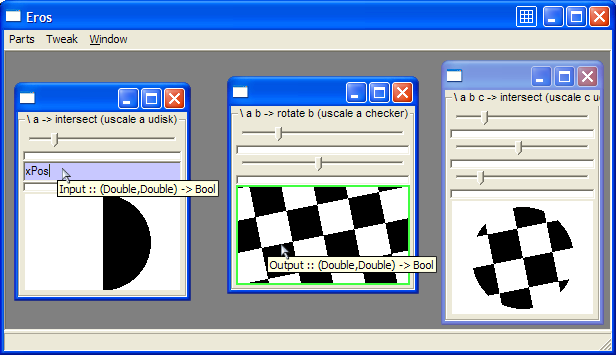ICFP ’07 paper draft — comments please
Warning: if you’re on the ICFP program committee and want to preserve double-blind reviewing, please ignore this post.
I’ve been working on an ICFP paper called “Tangible Functional Programming”, revising my last year’s submission on Eros. If you’re interested in taking a look, I’d greatly appreciate any comments, especially before the April 6 submission deadline.
Abstract
We present a user-friendly approach to unifying program creation and execution, based on a notion of “tangible values” (TVs), which are visible and interactive GUI manifestations of pure values. Programming happens by gestural composition of TVs. Our goal is to give end-users the ability to create parameterized, composable content without imposing the usual abstract and linguistic working style of programmers. We hope that such a system will put the essence of programming into the hands of many more people, and in particular people with artistic/visual creative style.
In realizing this vision, we develop algebras for visual presentation and for “deep” function application, where function and argument may both be nested within a structure of tuples, functions, etc. Composition gestures are translated into chains of combinators that act simultaneously on statically typed values and their visualizations.
Here is a figure from the paper, showing one stage of an interactively composed interactive 2D region. The user selects compatibly-typed input and output widgets, typically in different TVs. The result is a new TV that merges the source TVs, except for the connected input and output, which vanish. The sliders control the disk and checker sizes and the checker’s rotation angle.

Edit on March 28:I just added two relevant pointers to the
Paul R. Potts:
Hi Conal,
29 March 2007, 2:14 pmI have read through your paper once and found your work to be quite interesting — perhaps not so practical at the moment and with the current implementation, but of genuine value for helping users learn what are normally more abstract parts of functional programming. I will go through it again tonight if I can and provide some comments. I am still relatively new at Haskell and the more abstract parts of functional programming, but work like this helps me make sense of it. I had to bash myself in the head many times before monads made sense to me, and I’m sure arrows will be the same way.
One of these days I’ve got to see if I can get to one of the FP conferences! As a practitioner I’m particularly interesting in practical applications.